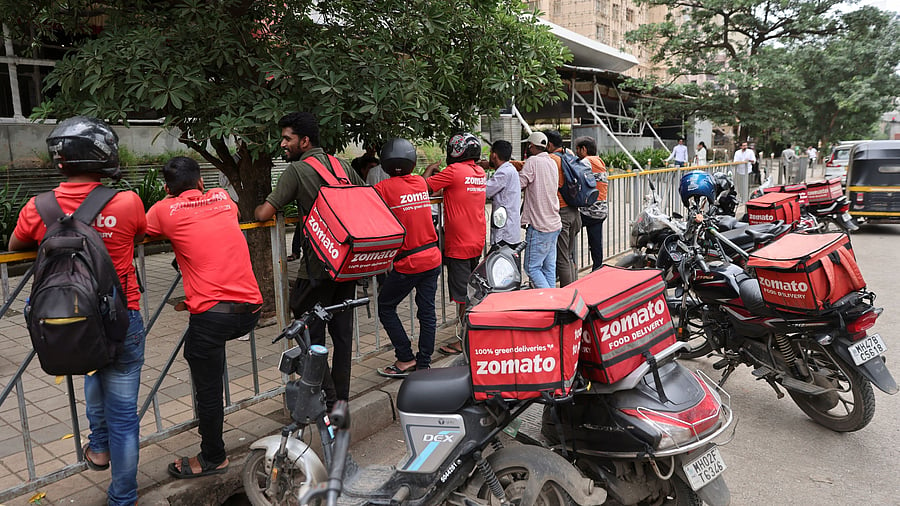
Gig workers wait in line to collect their delivery order outside a mall.
Credit: Reuters Photo
A new breed of workers, delivering food and grocery items or providing courier services, has gained visibility in our cities as they snake in and out of traffic on their two-wheelers at great speed to deliver goods ‘within half an hour'—these are the gig or platform workers. Governments are taking notice of the risks they face, prompting Karnataka to introduce an insurance scheme offering Rs 2 lakh life insurance, another Rs 2 lakh for accidental death, and some coverage for hospital expenses for an estimated two lakh gig workers in the state.
This is to be implemented by the Karnataka State Unorganised Workers’ Social Security Board (henceforward Board). While commendable, this initiative reflects the long-standing issue of sector-specific, fragmented schemes that hinder decades-long efforts to provide universal social security for the 93% unorganised workers.
The gig-workers’ insurance scheme mirrors one already put in place for private commercial transport workers by the Board. However, this raises concerns. Should workers receive benefits in the event of their demise? What about essential benefits like health care, sickness, unemployment, family/child support, and pensions during their lifetime? Presumably, they will have to navigate separate schemes with distinct eligibility criteria, potentially excluding them.
The fragmented nature of schemes becomes more apparent if one were to consider the education assistance under the Private Commercial Transport Workers’ Accident Benefit Scheme: educational assistance of Rs 10,000 per annum is given to a maximum of two children of the driver, only if he suffers accidental death or permanent disablement. But there is no scholarship for his children if he is still alive and able-bodied. Similarly, gig-workers' children lack scholarships, either when the worker is alive or after his death, while construction workers' children get scholarships from pre-school to post-graduation.
The Unorganised Workers’ Social Security (UWSS) Act of 2008, under which the Board has been constituted, aimed to provide universal social security to every unorganised worker and provide all nine benefits prescribed by the ILO. However, due to its several inherent deficiencies, it has struggled to gain traction and has remained a non-starter. According to the Board’s website, after 14 years of its constitution, only 4,30,198 registered workers have availed themselves of sector-specific schemes, receiving only one or two benefits. At this rate of registration of workers for a few benefits, it would take roughly 400 years to cover all 1.2 crore unorganised workers in the state and more than 1,000 years to give them all nine social security benefits prescribed by the ILO.
The question is why sector-specific measures are being introduced when there is no requirement under the UWSS Act to formulate schemes sector-wise. This may be due to the assumption that financing universal social security in one go for all 93% of unorganised workers is daunting, which is misplaced as the means to achieve it have not been explored at all. The Karnataka government plans to fund the entire scheme itself by imposing an additional surcharge on vehicle registrations, and there is only a proposal to tax the aggregators/employers in the future.
The Madhya Pradesh Unorganised Workers Welfare (MP) Act of 2003 offers an effective model for raising resources to fund universal social security, mandating employers to pay 5% of wages as a cess. The MP Act also mandates additional cesses on various state-level taxes and royalties to provide the government’s contribution to a single social security fund: in addition to a tax on certain motor vehicles, a duty on transfer of property, a welfare cess on the sale or supply of forest produce, royalty on certain minor minerals, and a welfare cess on notified agricultural produce are imposed.
To achieve universal coverage of social security, the National Advisory Council during the UPA’s tenure suggested clear and unambiguous exclusion criteria: to be excluded were only two categories of workers: (i) workers already covered by the existing PF and ESIC schemes; and (ii) self-employed and other workers who pay income tax and are relatively better-off. All others were to be covered without restrictions on sectors, limits on wages, the number of workers in an establishment, etc., to make coverage of unorganised workers universal.
The Covid lockdown highlighted the precarious existence of a 93% unorganised workforce, emphasising the urgent need for universal social security. A universal scheme cannot be achieved without contributions from workers, employers, and governments. The government’s contribution is also essential to make up for those workers in the unorganised sector who may not be able to contribute at all. There is a need to formulate a composite scheme providing all nine ILO social security benefits through a single contribution by worker, employer, and government to a single fund and get rid of the multiplicity of piecemeal, varied, and confusing schemes.
In this regard, the National Advisory Council under the UPA government had also projected that if a worker contributes Rs 1,000 per year from the entry age of 20 years and the employer and government match the contribution equally, the accumulated amount in her name at age 60 would be Rs 7,41,420, which would yield a monthly pension of Rs 5,684 and an annual pension of Rs 68,208. With a 50% stepped-up contribution every five years, the monthly pension would be as high as Rs 17,800.
Since the Union’s Social Security Code 2020, which will subsume the UWSS Act, has yet to say anything about all this, it is a golden opportunity for Karnataka to frame a composite new state Act for universalising unorganised workers' social security with all benefits built in and provide a model for the entire country.
(The writer is the Executive Trustee of CIVIC-Bangalore and a life member of the Social Security Association of India.)